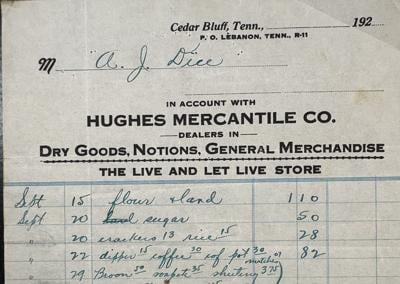Last week we finished our visit with Ruby Stone Hughes, who had written a short book on her childhood in the Cedar Bluff community of Trousdale County.
But we are not finished with the Cedar Bluff community!
RubyŌĆÖs husbandŌĆÖs family ran a general store in the little rural area across the Cumberland River from Hartsville. And this month we are going to be visiting the small country stores of our countyŌĆÖs past ŌĆ” the original ŌĆśWalmartsŌĆÖ of their day!
When the first settlers entered the untamed forests and hills of Middle Tennessee, they simply carried with them what they needed ŌĆ” imagine packing for a journey and taking a yearŌĆÖs worth of supplies!
Of course, they didnŌĆÖt need to go to the grocery store, as they hunted and foraged for their meals. And, they simply made do with one pair of britches, a shirt and one pair of shoes.
Hartsville had a store selling ŌĆśdry goodsŌĆÖ by 1807, if not before.
The early pioneers had to visit town and buy the goods they had run out of or couldnŌĆÖt make for themselves ŌĆ” such as coffee, sugar, salt, tea, sewing supplies and farm tools.
Gradually, each small community in our county had its own little general store ŌĆ” the name implies that it sells a ŌĆ£generalŌĆØ selection of items.
The Hughes store in Cedar Bluff dated from the late 1800s and operated until 1927, with three generations of the Hughes family running it over time.
Like many of the other small stores we will be looking at, it closed as more and more people purchased automobiles that allowed them to travel to larger towns to shop.
Why shop locally when you can drive to Lebanon or Nashville?
The HughesŌĆÖ general store was unique in that it backed up to the Cumberland River and was also a landing for steamboats going up and down the river. The store kept a warehouse in addition to the store, where goods could be left for later delivery or pickup when a steamboat stopped by.
Another difference in the HughesŌĆÖ store is that the family lived in the back of the store.
Most rural stores were in the front yard of the family home, separate but close enough to keep an eye on things ŌĆ” it wasnŌĆÖt unusual for someone to wake up the proprietor in the middle of the night for a bottle of medicine, since general stores carried all types of bottled cures for ŌĆ£what ails ya.ŌĆØ They were a pharmacy, hardware store, grocery store and even gas station in their day.
The Hughes family kept a canoe tied up by the dock on the river for a special use.
When people on the other side of the river needed an item, but didnŌĆÖt want to have to go into Hartsville, they would stand on the bank and holler over the water to get Mr. HughesŌĆÖ attention.
Then they would tell him what they needed and he would pull whatever they wanted from the store shelves and take the item across the river to them ŌĆ” howŌĆÖs that for service!
Because of its location, in the middle of prosperous farm land, the store also operated a small grist mill and a blacksmith shop.
Roger Foley, a talented African American blacksmith, worked at the shop, repairing broken tools, farm equipment and, of course, shoeing horses and mules. When the store closed, Foley moved to Nashville and was written up in that cityŌĆÖs papers for his skill with the blacksmithŌĆÖs hammer and anvil.
Like all country stores, it held a big cast iron pot bellied stove. The local men of the area would stop by on slow days in the winter, just to sit by the stove and visit. In the summer, when it was too hot to plow, the porch of the old store welcomed friends and neighbors to stop and sit a spellŌĆ”today the old building is still standing, but is used as a home.













(0) comments
Welcome to the discussion.
Log In
Keep it Clean. Please avoid obscene, vulgar, lewd, racist or sexually-oriented language.
PLEASE TURN OFF YOUR CAPS LOCK.
Don't Threaten. Threats of harming another person will not be tolerated.
Be Truthful. Don't knowingly lie about anyone or anything.
Be Nice. No racism, sexism or any sort of -ism that is degrading to another person.
Be Proactive. Use the 'Report' link on each comment to let us know of abusive posts.
Share with Us. We'd love to hear eyewitness accounts, the history behind an article.